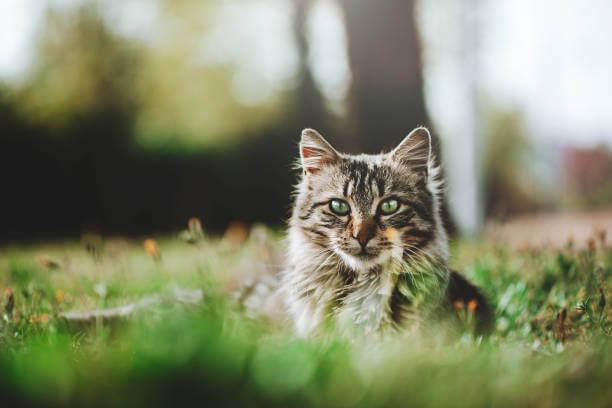Discover the incredible diversity of 7 Types of Wild Cats in Michigan From cougars and bobcats to lynxes and caracals, explore this fascinating look into their variety. Michigan, with its diverse landscapes and abundant wildlife, is home to a remarkable array of wild cats. From the elusive bobcat to the majestic cougar, these feline inhabitants roam the forests and wilderness areas of the Great Lakes State. Join us on an exciting journey as we explore the seven types of wild cats found in Michigan, delving into their unique characteristics, habitats, and conservation efforts.

7 Types of Wild Cats in Michigan
1. Bobcat
The bobcat (Lynx rufus) is a small but mighty predator that can be found throughout Michigan’s forests, swamps, and even suburban areas. Known for their distinctive short tail with a black tip and tufted ears, bobcats are skilled hunters with a diet consisting primarily of rabbits and small mammals. Despite their solitary nature, they have adapted well to human presence and can occasionally be spotted near residential areas.
2. Cougar
Once declared extinct in Michigan, cougars (Puma concolor) have made a remarkable comeback in recent years. Also known as mountain lions or pumas, these powerful cats require vast territories for hunting and survival. Although sightings are rare due to their elusive behavior, there have been confirmed reports indicating that cougars have returned to their historic range in parts of Michigan.
3. Canada Lynx
The Canada lynx (Lynx canadensis) is a medium-sized wild cat species that thrives in regions dominated by dense coniferous forests. With its large paws designed for traversing snowy landscapes and distinctive ear tufts, this lynx is specially adapted to endure harsh winters. While sightings are infrequent due to their secretive nature, northern parts of Michigan offer suitable habitats for this beautiful feline.
4. Eastern Cougar
The eastern cougar (Puma concolor couguar), a subspecies of the cougar, was historically found in Michigan. However, it is believed to have been extirpated from the state since the early 1900s. Despite unconfirmed reports and occasional sightings, its existence in Michigan remains highly debated among experts.
5. Lynx
The lynx (Lynx lynx) is another wild cat species that once roamed Michigan’s forests but has not been officially documented in the state for many years. Although there have been rare reports of lynx sightings, it is challenging to confirm their presence in Michigan. Nevertheless, these magnificent creatures are worth mentioning due to their historical significance and potential future reintroduction efforts.
6. Domestic Cat
While domestic cats may not be considered “wild” in the traditional sense, feral cats have established self-sustaining populations throughout Michigan’s urban and rural areas. These feral cats are descendants of abandoned or lost domestic cats and possess innate hunting instincts similar to their wild counterparts. It is important to note that feral cats can negatively impact native wildlife if not properly managed through responsible pet ownership and trap-neuter-release programs.
7. Lynx-Rufus Hybrids
In recent years, genetic research has revealed the presence of hybrids between bobcats and Canada lynx in certain regions of North America, including parts of Michigan. These hybrid individuals exhibit characteristics intermediate between the two parent species, showcasing the fascinating possibilities that can arise when different wild cat populations come into contact.
Michigan’s wild cats contribute to the state’s ecological diversity and serve as an indicator of a healthy ecosystem. As stewards of these remarkable creatures, it is crucial for us to support conservation efforts that protect their habitats and ensure their long-term survival. By understanding and appreciating the unique qualities of each wild cat species in Michigan, we can work towards fostering a harmonious coexistence between humans and these magnificent feline residents.
What to Do if You Encounter a Wild Cat
Encountering a wild cat in the wild can be an exciting experience, but it is important to remember that these animals are still wild and should never be approached or touched. If you do happen to come across a wild cat in Michigan, keep your distance and observe from afar. It’s also important to minimize human activity in known habitats of these cats to ensure their safety.
You should also contact the local wildlife authorities if you spot a wild cat in your area, as they can help manage and protect the species. Additionally, providing resources for habitat conservation or volunteering at a wildlife rehabilitation center are great ways to support Michigan’s wild cat populations. With our collective efforts, we can ensure these majestic creatures will continue to roam the forests of Michigan for many years to come.

Final Thoughts
Michigan’s wild cats are a fascinating and integral part of the state’s diverse wildlife. From the elusive bobcat to the majestic cougars, these feline inhabitants contribute to Michigan’s ecological diversity and serve as an indicator of a healthy ecosystem. By learning more about these remarkable creatures and supporting conservation efforts, we can help ensure their long-term survival in the Great Lakes State. Looking ahead, we can look forward to a future where Michigan’s wild cats continue to thrive in their natural habitats.
As human populations and development expand in the state, it is essential for us to keep these cats top of mind and take proactive steps to protect their future. By understanding the ecological importance of these animals and committing ourselves to conservation efforts, we can ensure that Michigan’s wild cats will remain part of the landscape for generations to come.
FAQS
Q: What is the most common wild cat species found in Michigan?
A: The Bobcat (Lynx rufus) is the most commonly seen and widely distributed wild cat species in Michigan. While it does have a statewide range, its populations are densest in northern regions of the state.
Q: Are there any efforts in Michigan to reintroduce wild cats?
A: Currently, there are no active plans to reintroduce any wild cat species into Michigan. However, there has been discussion among conservationists and wildlife experts about the potential for cougars to make a markable comeback in certain areas of the state.
Q: Are feral cats considered “wild” in Michigan?
A: Feral cats, while not technically considered “wild,” can be found in both urban and rural areas of Michigan. They are descendants of abandoned or lost domestic cats and possess innate hunting instincts similar to their wild counterparts. It is important to note that feral cats can hurt native wildlife if not properly managed.
Q: What should I do if I come across a wild cat in Michigan?
A: If you come across a wild cat in the wild, it is important to keep your distance and observe from afar. Additionally, contact the local wildlife authorities if you spot a wild cat in your area, as they can help manage and protect the species. Providing resources for habitat conservation or volunteering at a wildlife rehabilitation center are other great ways to support Michigan’s wild cat populations.
Conclusion
Michigan is home to some incredible wild cat species, including bobcats, cougars, and even lynx-rufus hybrids. It is essential that we take steps to protect these animals and support conservation efforts so that they can continue to thrive in the state for many years to come. By understanding the ecological importance of wild cats and committing ourselves to responsible stewardship, we can ensure a future where these majestic felines remain part of the Michigan landscape.
The success of wild cat conservation in Michigan depends on the collective efforts of individuals, organizations, and government agencies. We all have a role to play in protecting these animals and their habitats, so let’s do our part to help keep Michigan’s wild cats wild!
